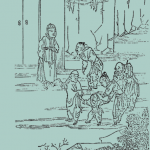 A Price History of Ming Famine
A Price History of Ming Famine
Speaker: Tim Brook (UBC) Although China in the Ming period had a large and sophisticated grain market, almost no grain price data survive – except for when famine struck. This presentation explores the possibilities and limits of what 774 famine pieces over half a dynasty might be able to tell us about the economic history […]
 Ties that Bind: State Formation and Economic Development in the Ancient Mediterranean
Ties that Bind: State Formation and Economic Development in the Ancient Mediterranean
Speaker: Taco Terpstra (Northwestern) Archaeological data show that the process of Mediterranean state formation starting around 700 BCE is positively correlated with economic development. Likewise, state disintegration after ca. 300 CE correlates with economic contraction. This paper will discuss what effect the formation and collapse of states had on the economy of the ancient Mediterranean, […]
 CANCELLED -Pacifists Making Guns: The Galton Family and Britain’s Industrial Revolution
CANCELLED -Pacifists Making Guns: The Galton Family and Britain’s Industrial Revolution
*Please note this lecture has been cancelled.* Speaker: Priya Satia (Stanford) The biggest gun-making firm in 18th-century Britain was owned by a Quaker family, the Galtons of Birmingham. They were major suppliers of guns to the slave trade in West Africa, the East India Company, settlers and trading companies in North America, and the British […]
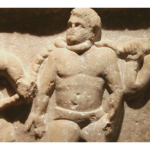 Putting a Face to Captivity in War in the Ancient Roman World
Putting a Face to Captivity in War in the Ancient Roman World
Putting a Face to Captivity in War in the Ancient Roman World By Katerina Huemoller (Department of CNERS, UBC) https://histories-cluster.ubc.ca/A-Face-to-Captivity Thousands of people were trafficked as a result of Rome’s conquest of the Mediterranean (c. 300 BCE – 100 CE). These individuals are mostly recorded in ancient sources in numerical form alone—as tallies of prisoners […]
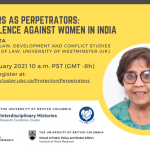 Protectors as Perpetrators: State Violence Against Women in India
Protectors as Perpetrators: State Violence Against Women in India
Protectors as Perpetrators: State Violence Against Women in India By Radha D’Souza (Law, Development and Conflict Studies, School of Law, University of Westminster, UK), organized by Sunera Thobani (Department of Asian Studies, UBC) https://histories-cluster.ubc.ca/ProtectorsPerpetrators Professor Radha D’Souza’s address will focus on state violence against women in India. India is widely perceived to be the most populous democracy […]
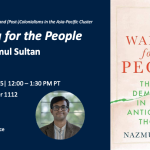 Waiting for the People with Nazmul Sultan
Waiting for the People with Nazmul Sultan
Waiting for the People reconstructs how the debates over peoplehood defined Indian anticolonial thought, and a bold new framework for theorizing the global career of democracy. This book is the first account of Indian answers to the question of peoplehood in political theory. From Surendranath Banerjea and Radhakamal Mukerjee to Mohandas Gandhi and Jawaharlal Nehru, […]
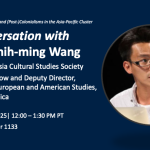 A Conversation with Andy Chih-ming Wang
A Conversation with Andy Chih-ming Wang
The Empires in Asia cluster is delighted to welcome interested graduate students and faculty to this informal lunchtime conversation with Andy Chih-Ming Wang (Academia Sinica; Inter-Asia Cultural Studies Society). Andy Chih-ming Wang is a Research Fellow and Deputy Director of the Institute of European and American Studies, Academia Sinica, Taipei, Taiwan, working in the intersected […]
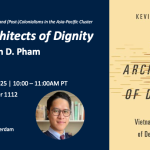 The Architects of Dignity with Kevin Pham
The Architects of Dignity with Kevin Pham
The Architects of Dignity introduce Vietnamese political thought to debates in political theory, showing how Vietnamese thinkers challenge Western conventional wisdom. Kevin D. Pham traces an intergenerational debate among six influential figures in colonial Vietnam. These figures had competing visions for how the Vietnamese should respond to French colonial domination, what the Vietnamese should do […]
 Emplacing East Timor with Kisho Tsuchiya
Emplacing East Timor with Kisho Tsuchiya
Emplacing East Timor explores the relationship between the cycle of regime change and that of knowledge production, offering an alternative framework to periodize the history from the 1850s to the 2010s. Kisho Tsuchiya shows that the prevailing perceptions of East Timor have been shaped by large-scale wars, postwar consolidation, and the dominance of foreign observers. […]
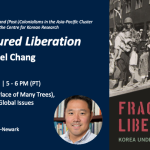 A Fractured Liberation with Kornel Chang
A Fractured Liberation with Kornel Chang
*Professor Kornel Chang will be giving a talk from 3:30 to 5:00 PM PT, followed by a conversation, which will take place from 5:00 to 6:00 PM. With the collapse of the Japanese Empire in August 1945, the Korean peninsula erupted with hopes that had been bottled up for nearly forty years. A Fractured Liberation […]